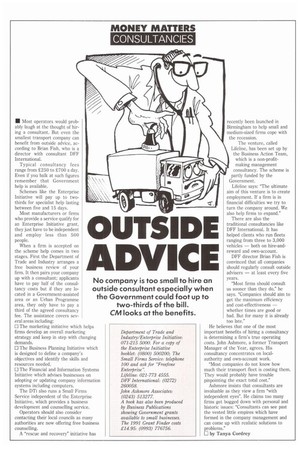OUTSIDE
Page 36

If you've noticed an error in this article please click here to report it so we can fix it.
ADViCE No company is too small to hire an outside consultant especially when the Government could foot up to two-thirds of the bill. CM looks at the benefits.
• Most operators would probably laugh at the thought of hiring a consultant. But even the smallest transport company can benefit from outside advice, according to Brian Fish, who is a director with consultant OFF International.
Typical consultancy fees range from £250 to £.700 a day. Even if you balk at such figures remember that Government help is available.
Schemes like the Enterprise Initiative will pay up to twothirds for specialist help lasting between five and 15 days.
Most manufacturers or firms who provide a service qualify for an Enterprise Initiative grant, they just have to be independent and employ less than 500 people.
When a firm is accepted on the scheme help comes in two stages. First the Department of Trade and Industry arranges a free business review of your firm. It then pairs your company up with a consultant; applicants have to pay half of the consultancy costs but if they are located in a Government-assisted area or an Urban Programme area, they only have to pay a third of the agreed consultancy fee. The assistance covers several areas including:
o The marketing initiative which helps firms develop an overall marketing strategy and keep in step with changing demands.
0 The Business Planning Initiative which is designed to define a company's objectives and identify the skills and resources needed.
LI The Financial and Information Systems Initiative which advises businesses on adopting or updating company information systems including computers.
The DTi also runs a Small Firms Service independent of the Enterprise Initiative, which provides a business development and counselling service.
Operators should also consider contacting their local councils as many authorities are now offering free business counselling.
A "rescue and recovery" initiative has Department of Trade and Industry/Enterprise Initiative: 071-215 5000. For a copy of the Enterprise Initiative booklet: (0800) 500200; The Small Firms Service: telephone 100 and ask for "Freefone Enterprise".
Lifeline: 021-773 4555. DFF International: (0272) 260058.
John Ashmore Associates: (0243) 513277.
A book has also been produced by Business Publications showing Government grants available to small businesses. The 1991 Grant Finder costs i'14.95: (0993) 776756.
recently been launched in Birmingham to help small and medium-sized firms cope with the recession.
The venture, called Lifeline, has been set up by the Business Action Team, which is a non-profit making management consultancy. The scheme is partly funded by the Government.
Lifeline says: "The ultimate aim of this venture is to create employment. If a firm is in financial difficulties we try to turn the company around. We also help firms to expand."
There are also the traditional consultancies like DFF International. It has helped clients who run fleets ranging from three to 3,000 vehicles — both on hire-andreward and own-account.
DFF director Brian Fish is convinced that all companies should regularly consult outside advisers — at least every five years.
"Most firms should consult us sooner than they do," he says. "Companies should aim to get the maximum efficiency and cost-effectiveness — whether times are good or bad. But for many it is already too late."
He believes that one of the most important benefits of hiring a consultancy is determining a firm's true operating costs. John Ashmore, a former Transport Manager of the Year, agrees. His consultancy concentrates on localauthority and own-account work.
"Most companies do not know how much their transport fleet is costing them. They would probably have trouble pinpointing the exact total cost."
Ashmore insists that consultants are invaluable as they view a firm "with independent eyes". He claims too many firms get bogged down with personal and historic issues: "Consultants can see past the vested little empires which have formed in the company management and can come up with realistic solutions to problems."
ID by Tanya Cordrey












































































